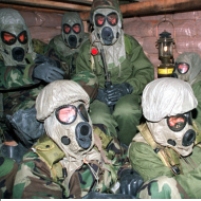Study Describes Gulf War Syndrome as Physical, Not Psychological
Monday, September 19, 2011
 (AP Photo)
(AP Photo)
A study from the University of Texas Southwestern Medical Center has concluded that sufferers of Gulf War Syndrome have noticeable abnormalities in their brains’ blood flow. The researchers also discovered that for many veterans, the circulatory problem is getting worse.
It is believed soldiers developed the illness because they were exposed to neurotoxic chemicals and nerve gas during the war. A 2008 report conducted by the Department of Veteran Affairs placed the blame on “1) use of pyridostigmine bromide (PB) pills, given to protect troops from effects of nerve agents, and 2) pesticide use during deployment.” An estimated 25% of the 697,000 military personnel deployed to the Persian Gulf region in 1990-1991 have the condition.
Patients diagnosed with Gulf War Syndrome endure memory and concentration problems, persistent headache, unexplained fatigue, and widespread pain. Some patients also experience chronic digestive difficulties, respiratory symptoms, and skin rashes.
-Noel Brinkerhoff, David Wallechinsky
Gulf War Syndrome Is Brain Damage Caused By Nerve Gas, Not Psychological Issues, UT Southwestern Study Proves (by Brantley Hargrove, Dallas Observer)
Hippocampal Dysfunction in Gulf War Veterans: Investigation with ASL Perfusion MR Imaging and Physostigmine Challenge (by Xiufeng Li, Jeffrey Spence, David Buhner, John Hart, Jr, C. Munro Cullum, Melanie Biggs, Andrea Hester, Timothy Odegard, Patrick Carmack, Richard Briggs, and Robert Haley, Radiology) (abstract)
Gulf War Illness and the Health of Gulf War Veterans: Scientific Findings and Recommendations (Research Advisory Committee on Gulf War Veterans’ Illnesses, Department of Veteran Affairs) (pdf)
- Top Stories
- Unusual News
- Where is the Money Going?
- Controversies
- U.S. and the World
- Appointments and Resignations
- Latest News
- Trump Renames National Football League National Trump League
- Trump to Stop Deportations If…
- Trump Denounces World Series
- What If China Invaded the United States?
- Donald Trump Has a Mental Health Problem and It Has a Name






Comments